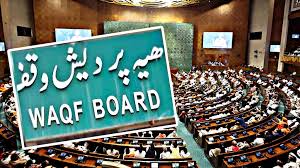
17-Sep-2024 , Updated on 9/17/2024 4:39:33 AM
Muslim Population Surge: Waqf Board Land Claims Explained
The surge in Muslim population has led most Muslims to acquire claims of waqf properties; these claims are based on the land that they believe is rightfully theirs, which are often based on historic records and legal tools that confirm the status of the land as a Muslim religious one. Likewise, having looked at the results of the demographic polls, which have recently been conducted in India, one can notice that the percentage of Hindus has decreased by 8%, while the Muslim’s amount has increased by 47%. However, there are also some other factors that contribute to this growth and reduction, such as birth rate, death rate, migration, etc. But that is not really what must be asked; the real question is, well, no matter where these people’s turn their eye and set their sight, there is always hope. They put up a board of Dargah-Mazar, and the ground in question is for Muslims. This is an area that needs more emphasis and knowledge of how and why it is done. To the intervention of those of you who may not be in tune with some of the Islamic laws, a waqf land as it is defined in the Islamic law is a piece of land that Muslims use or donate for charity; the owners cannot transfer the ownership of the land.
As per some sources, the Waqf Board has been thus asserting various plots of land as waqf property by putting signboards like ‘Dargah’ or ‘Mazar’ (tomb). It has raised questions and concerns about the credibility of the statement made by the Waqf Board, but they are believed to be outside the legal procedure that is required to name a property as waqf, and this leads to issues. In addition to that, many waqf lands were set up a long time ago, hundreds of years ago, and as such, certain records and demarcations may not ideally be clear. This is so since the recipient of both the grants of immovable properties to the Islamic Waqf Board and the rights to the use of the disputed lands is shrouded in much ambiguity, which only serves to complicate the task of proving the authenticity of the claims being made by the Waqf Board and the rightful owner of the disputative territories. Furthermore, the research also reveals the importance of clarity when it comes to the creation of waqf properties so that future problems do not arise.
And with increasing awareness of this ascendance in land claims that may paint a new social-economic status and perhaps strain the populace, the government has to ensure all that is done rightly and rightly in compliance with the laws of the country. This thus calls for careful draughting of all legal documents and, most importantly, strengthening of the legal structure where it is deficient.

Student
hey there! i am a student currently pursuing my bachelors with a keen interest in writing., I am fueled by a deep love for storytelling and a flair for creating captivating narratives. Armed with a passion for language and a keen eye for detail, I strive to craft compelling copy that leaves a lasting impact.
Join Our Newsletter
Subscribe to our newsletter to receive emails about new views posts, releases and updates.
Copyright 2010 - 2026 MindStick Software Pvt. Ltd. All Rights Reserved Privacy Policy | Terms & Conditions | Cookie Policy